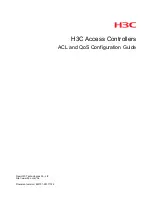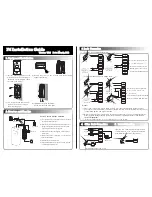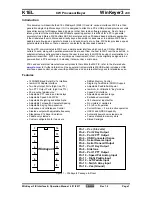
© 2011 Cisco and/or its affiliates. All rights reserved. This document is Cisco Public Information.
Page 2 of 4
Wireless LAN Controller Series
The Cisco 2100 Series Wireless LAN Controllers are part of the Cisco Wireless LAN Controller family of products,
which includes standalone controllers, integrated controllers, and modular wireless LAN controllers that work in
conjunction with Cisco switches and routers. For details, visit: Cisco Unified Wireless Network Overview.
Features and Benefits
Table 2 describes the hardware features of the Cisco 2100 Series Wireless LAN Controllers.
Table 2.
Features and Benefits of the Cisco 2100 Series Wireless LAN Controllers
Features
Benefits
Eight 10/100 Ethernet Ports
Provides eight 10/100 Ethernet ports, intended to support a combination of access points and redundant LAN
uplinks
Power-over-Ethernet-Enabled
Ports
Two of the eight 10/100 Ethernet ports are 802.3af Power over Ethernet (PoE) and Cisco PoE enabled, rated
for use with Cisco Aironet
®
lightweight access points
Small Form Factor
Allows for convenient desktop mounting or rack mounting, with optional rack mount kit for flexible deployment
Extended Secure Coverage
Extended secure coverage for larger stores and warehouses
PCI Integration
Supports a PCI-certified architecture for retail customers
Support for 802.11n
Offers robust coverage with 802.11 a/b/g or delivers unprecedented reliability using 802.11n and Cisco Next-
Generation Wireless Solutions and Cisco Enterprise Wireless Mesh
Product Specifications
Table 3 lists the product specification for Cisco 2100 Series Wireless LAN Controllers.
Table 3.
Product Specifications for the Cisco 2100 Series Wireless LAN Controller
Item
Specification
Wireless Standards
IEEE 802.11a, 802.11b, 802.11g, 802.11d, 802.11h, 802.11n
Wired/Switching/Routing
IEEE 802.3 10BASE-T, IEEE 802.3u 100BASE-TX specification, and IEEE 802.1Q VLAN tagging
Data RFCs
●
RFC 768 UDP
●
RFC 791 IP
●
RFC 792 ICMP
●
RFC 793 TCP
●
RFC 826 ARP
●
RFC 1122 Requirements for Internet Hosts
●
RFC 1519 CIDR
●
RFC 1542 BOOTP
●
RFC 2131 DHCP
Security Standards
●
Wi-Fi Protected Access (WPA)
●
IEEE 802.11i (WPA2, RSN)
●
RFC 1321 MD5 Message-Digest Algorithm
●
RFC 2104 HMAC: Keyed Hashing for Message Authentication
●
RFC 2246 TLS Protocol Version 1.0
●
RFC 3280 X.509 PKI Certificate and CRL Profile
Encryption
●
WEP and Temporal Key Integrity Protocol-Message Integrity Check (TKIP-MIC): RC4 40, 104 and 128
bits (both static and shared keys)
●
Secure Sockets Layer (SSL) and Transport Layer Security (TLS): RC4 128-bit and RSA 1024- and 2048-
bit
●
Advanced Encryption Standard (AES): CCM, Counter Mode with Cipher Block Chaining Message
Authentication Code Protocol (CCMP)






















